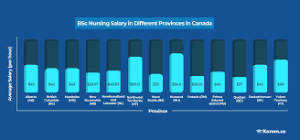Travel Nurse Salary Canada
Travel Nurse Salary in Canada: What You Need to Know in 2025
Travel nursing is an exciting and lucrative career path for healthcare professionals seeking flexibility, higher pay, and the opportunity to explore different regions. If you’re considering becoming a travel nurse in Canada, understanding the salary expectations is essential. In this guide, we’ll break down the average travel nurse salary in Canada, what affects it, and how to maximize your earnings.
How much does a travel nurse typically make in Canada?
Depending on a number of important variables, including location, experience, specialty, and contract conditions, the typical travel nurse income in Canada as of 2025 ranges from CAD $80,000 to $120,000 annually.
Rate per Hour:
In Canada, the majority of travel nurses make between $40 and $65 per hour, although some highly skilled nurses make up to $75.
What Elements Impact Travel Nurse Salary?
In Canada, some factors affect your travel nurse pay, such as:
Location: Wages are generally greater in rural and urban hospitals.
Experience Level: 15–25% more money is paid to nurses with five or more years of experience.
Specialty: Psychiatric, ICU, OR, and ER nurses frequently earn higher compensation.
Shift Types: Weekends, overtime, and night shifts can increase hourly pay.
Agency or Direct Hire: Employing an agency may result in somewhat lower base pay but more benefits.
Benefits Beyond Salary
While salary is important, travel nursing in Canada also comes with other advantages:
-
Free or subsidized housing
-
Travel reimbursement
-
Meal and incidentals allowance
-
Health insurance and retirement contributions
-
Professional development opportunities
How to Maximize Your Earnings
Want to earn top dollar as a travel nurse in Canada? Here are a few tips:
-
Gain Certifications: ACLS, TNCC, and specialty certifications can increase your value.
-
Be Flexible: Accepting assignments in remote or underserved areas pays more.
-
Work with Reputable Agencies: Partner with agencies known for high pay and transparent contracts.
-
Take Longer Assignments: Extended contracts often include completion bonuses.
-
Negotiate: Always discuss pay, bonuses, and benefits before signing.
Frequently Asked Questions
Is there a high demand for travel nurses in Canada?
Yes, due to ongoing staffing shortages and an aging population, travel nurses are in high demand across most provinces.
Do I need a special license?
You must be licensed with the provincial regulatory body (e.g., CNO in Ontario, BCCNM in BC). Some agencies assist with temporary licensing.
Can international nurses work as travel nurses in Canada?
Yes, but they must meet Canadian immigration and licensure requirements. The Express Entry program or work permits can help facilitate this.
Travel Nurse Salary by Province
| ProvinceAverage | Estimatede | Estimated Annual Salary |
|---|---|---|
| Ontario | $45 – $65 | $90,000 – $115,000 |
| British Columbia | $50 – $70 | $100,000 – $120,000 |
| Alberta | $48 – $68 | $95,000 – $115,000 |
| Quebec | $42 – $60 | $85,000 – $105,000 |
| Manitoba/Saskatchewan | $40 – $58 | $80,000 – $100,000 |
| Atlantic Provinces | $38 – $55 | $75,000 – $95,000 |
| Northern Regions | $60 – $75 | $110,000 – $130,000+ |
